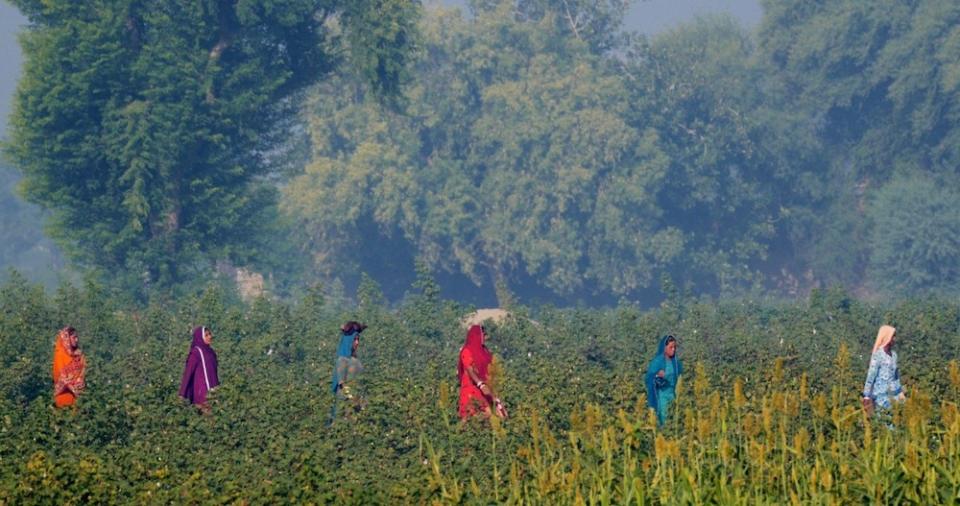Artistic Milliners Details Recycling, Farming Programs in ESG Report

Artistic Milliners’ (AM) 2023 ESG Report puts together the puzzle pieces that make up its responsible and future-led ecosystem.
A three-part sustainability strategy that targets people, the community and planet is informing decisions from the top down. “As industry contributors, we bear the responsibility to drive positive transformations for our planet and its people,” said Yaqoob Ahmed, AM chairman.
More from Sourcing Journal
In the report, the Pakistani parent company of Artmill, Circular Park, Artistic Energy, Star Fades International and eponymous denim manufacturer, shares the successes and challenges in areas like waste reduction, traceability, organic cotton farming, regenerative agriculture and fair labor practices.
The report emphasized the organization’s journey toward achieving net-zero emissions system-wide by 2040, leveraging cleaner technologies, green infrastructure and renewable energy production.
To date, AM reports that it has commissioned 12 MW of rooftop solar projects at its facilities. Outside the company’s facilities, its clean energy subsidiary, Artistic Energy, powers over 144,000 homes through wind farms, mitigating 220,000-plus tonnes of GHG emissions annually. It has reduced Scope I and II emissions by over 50 percent in three years.
AM, which has implemented ZDHC wastewater guidelines, currently recycles 1 million gallons daily. The company is working toward 1.5 million gallons of water per day by 2025 and is committed to achieving 100 percent zero liquid discharge (ZLD) by 2027, which will be made possible by installing a ZLD plant.
This effort to reduce waste continues into textiles. AM’s created 2,752 tonnes of non-hazardous waste in 2023, compared to 4,877 tonnes in 2022. The report highlights investments in technologies to recycle post-consumer (PCW) and post-industrial (PIW) denim waste into new products, and how the vertical operation designs for circularity.
At Circular Park, the 70,000-square-foot recycling facility AM opened in 2022, the company produces nearly 1,400 tonnes of recycled yarn. Up next, the company is investigating how to apply traceable technologies like Oritain or Haelixa to the recycled fibers.
AM produced 144 million meters of fabric and 36 million garments in 2023. Most fabrics contained a form of sustainable, recycled and biodegradable components such as recycled PIW and PCW cotton, hemp, Tencel, Lycra EcoMade and Roica.
The report sheds light on AM’s numerous agriculture programs, including new goals set for the expansion of the Milliner Cotton Initiative (MCI), AM’s “farm-to-fashion” sustainable cotton program. MCI aims to grow its current 1,000 farmer participants to 4,000 farmers, pickers and ginners by 2026.

Through Milliner Organic (MO), a program that supports an indigenous supply chain, AM distributed 9,500 seed bags and 20 tonnes of biofertilizer to farmers in Kohlu, Pakistan. Seven automatic weather stations that monitor climate change and document patterns, were also installed at MO farms.
Regenerative agriculture is growing in importance for AM as well. In 2023, the company launched a pilot with RegenAgri that includes 92 farmers across 1,000 acres in Pakistan. The first harvest was in October.
The farming programs are especially important in AM’s efforts to support women. MCI is halfway to its goal of having 900 female cotton pickers by 2026. MCI Alternative Livelihood Programs, AM trains women and farming families to pick cotton and develop entrepreneurship skills to stabilize their income during the off-season. Additionally, the program provides equipment for other farm activities like incubators for chick-hatching, beekeeping and sewing centers. A “craft to commerce” project teaches women handicrafts, embroideries and sewing to earn extra income.
Women’s initiatives are taking place across AM’s workforce, which is 27.3 percent female. To date, 80 percent of its female workforce has completed the P.A.C.E. (Personal Advancement and Career Engagement) program in collaboration with Gap Inc. The company also became the first in Pakistan in 2023 to partner with Better Work and pilot a program called “Building Respectful, Safe & Healthy Factory Floors.”

